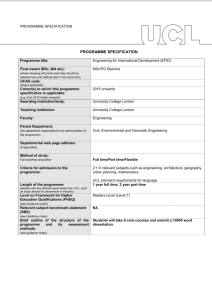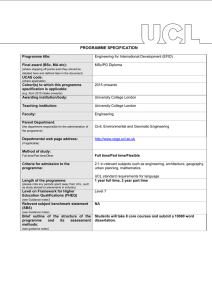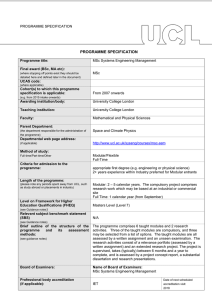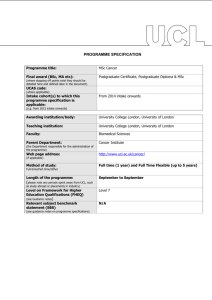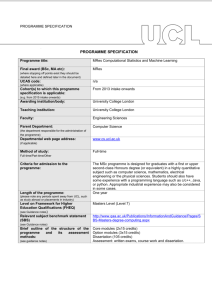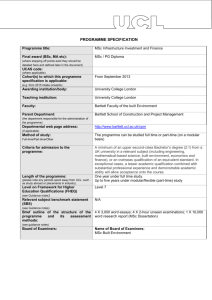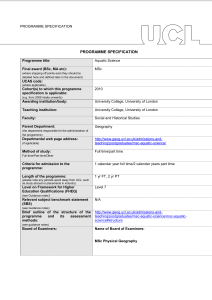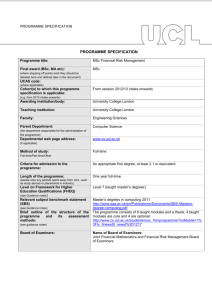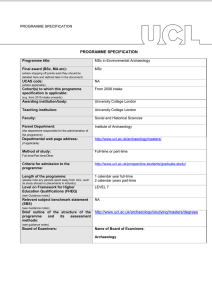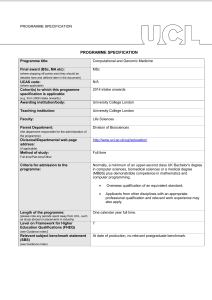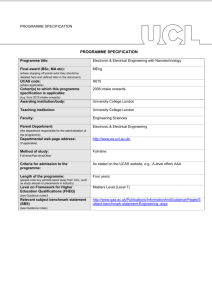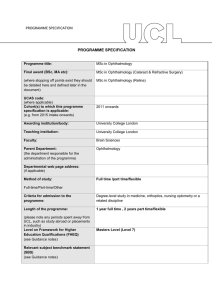MSc Technology Entrepreneurship
advertisement
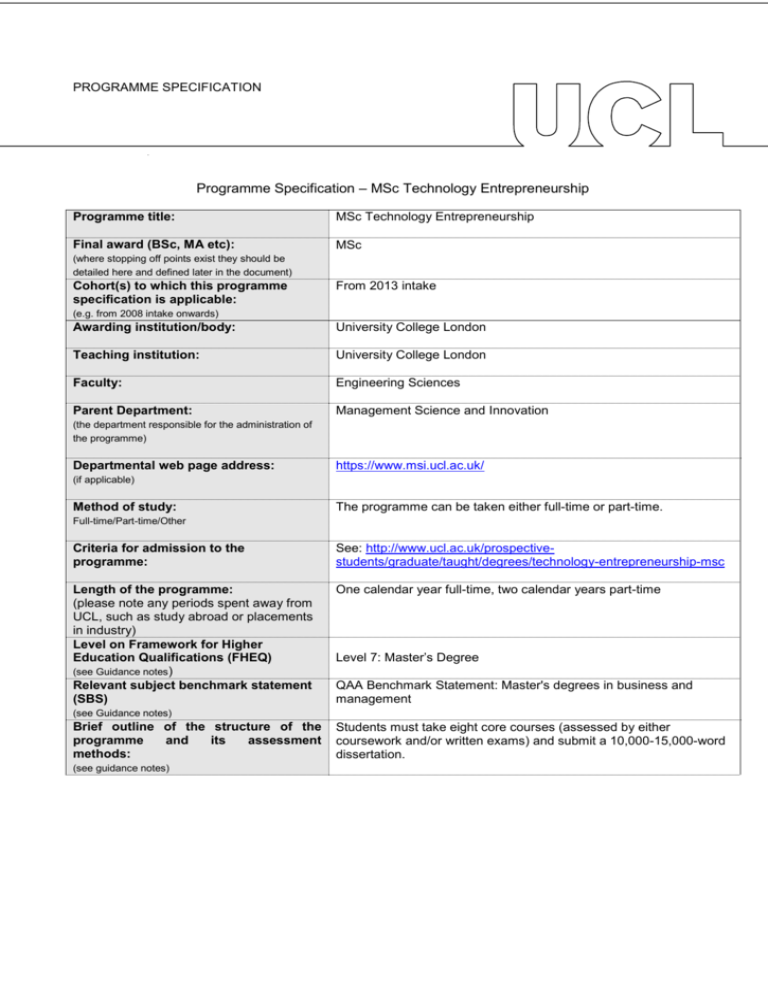
PROGRAMME SPECIFICATION Programme Specification – MSc Technology Entrepreneurship Programme title: MSc Technology Entrepreneurship Final award (BSc, MA etc): MSc (where stopping off points exist they should be detailed here and defined later in the document) Cohort(s) to which this programme specification is applicable: From 2013 intake (e.g. from 2008 intake onwards) Awarding institution/body: University College London Teaching institution: University College London Faculty: Engineering Sciences Parent Department: Management Science and Innovation (the department responsible for the administration of the programme) Departmental web page address: https://www.msi.ucl.ac.uk/ (if applicable) Method of study: The programme can be taken either full-time or part-time. Full-time/Part-time/Other Criteria for admission to the programme: See: http://www.ucl.ac.uk/prospectivestudents/graduate/taught/degrees/technology-entrepreneurship-msc Length of the programme: (please note any periods spent away from UCL, such as study abroad or placements in industry) Level on Framework for Higher Education Qualifications (FHEQ) (see Guidance notes) Relevant subject benchmark statement (SBS) One calendar year full-time, two calendar years part-time Level 7: Master’s Degree QAA Benchmark Statement: Master's degrees in business and management (see Guidance notes) Brief outline of the structure of the programme and its assessment methods: (see guidance notes) Students must take eight core courses (assessed by either coursework and/or written exams) and submit a 10,000-15,000-word dissertation. Board of Examiners: Name of Board of Examiners: Management Science and Innovation Board (MSING) Professional body accreditation (if applicable): N/A Date of next scheduled accreditation visit: EDUCATIONAL AIMS OF THE PROGRAMME: The MSc Technology Entrepreneurship at UCL provides recent graduates with the skills and knowledge to allow them to participate effectively in the creation and growth of high-impact, technology-based business ventures. PROGRAMME OUTCOMES: The programme provides opportunities for students to develop and demonstrate knowledge and understanding, qualities, skills and other attributes in the following areas: A knowledge and understanding of: A: Knowledge and understanding Teaching/learning methods and strategies The analysis and evaluation of data and options required to inform sound managerial decisions relating to a new business opportunity The integration of entrepreneurial theory and practice along with an understanding of the practicalities and limitations of existing management frameworks in the context of a specific new business opportunity. Through a structured programme of one-hour or twohour seminars and classes that cover topics relating to the generation of new business concepts, the assessment of feasibility and the execution of appropriate business models and strategies. Teaching methods include group and project based activities along with case-based teaching. Students will be required to attend all classes, study extensively on their own and make effective contributions to groupbased activities. Students will be assessed by a variety of methods that include: class participation; open-book and ‘unseen’ examinations, long essays; presentations and group or individual course work. Through group and individual project and dissertation assignments that relate to the market, technical and financial viability of a new business opportunity. B: Skills and other attributes Intellectual (thinking) skills - able to: Teaching/learning methods and strategies The programme aims to help students: Throughout the programme, all courses will introduce information that will need to be assessed critically and will demonstrate that how conflicting interpretations arise from the same information. Develop and encourage creativity at the individual, team and enterprise scale. Critically evaluate evidence and strategy in the context of emerging business opportunities. Assess, quantify and where appropriate mitigate critical risks and uncertainties arising from incomplete or imperfect information Assessment: Particularly through group and individual project and dissertation assignment. C: Skills and other attributes Practical skills - able to demonstrate skills that relate to: Teaching/learning methods and strategies The planning and completing a research topic within a given time scale Experience of gathering and evaluating primary and secondary research material Critical evaluation, analysis and synthesis of research material An appreciation of the difficulties of data gathering and analysis The selection and application of appropriate techniques of analysis to data An understanding the way data gathering relates to later analysis and conclusions The presentation, justification and defence of a research findings through the writing of reports and dissertations through ‘hands-on’ instruction through group and individual presentations through seminar and class discussion through visits to libraries and institutes through tutorial support and supervision • Assessment: Open-book and ‘unseen’ examination, course work, long-essay, class participation and dissertation. D: Skills and other attributes Transferable skills - able to demonstrate: Time management of a complex project over an extended period Understanding the role of academic research in a broader business context Skills in academic writing, scholarship, referencing and authorship Confidence applying dissemination skills in areas of new knowledge. Teaching/learning methods and strategies: reports, course work, dissertation using data bases, consulting on-line library catalogues, using web-site material seminar presentations seminars, library visits, ‘hands-on’ instruction reading, class discussion Assessment: Presentations, course work, long-essay, class participation and dissertation. The following reference points were used in designing the programme: the Framework for Higher Education Qualifications: (http://www.qaa.ac.uk/en/Publications/Documents/Framework-Higher-Education-Qualifications-08.pdf); the relevant Subject Benchmark Statements: (http://www.qaa.ac.uk/assuring-standards-and-quality/the-quality-code/subject-benchmark-statements); the programme specifications for UCL degree programmes in relevant subjects (where applicable); UCL teaching and learning policies; staff research. Please note: This specification provides a concise summary of the main features of the programme and the learning outcomes that a typical student might reasonably be expected to achieve and demonstrate if he/she takes full advantage of the learning opportunities that are provided. More detailed information on the learning outcomes, content and teaching, learning and assessment methods of each course unit/module can be found in the departmental course handbook. The accuracy of the information contained in this document is reviewed annually by UCL and may be checked by the Quality Assurance Agency. Programme Organiser(s) Dr David Chapman Name(s): Date of Production: 22nd August 2008 Date of Review: September 2014 Date approved by Head of Department: September 2014 Date approved by Chair of Departmental Teaching Committee: Date approved by Faculty Teaching Committee: October 2014 January 2015
